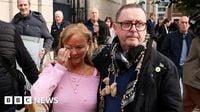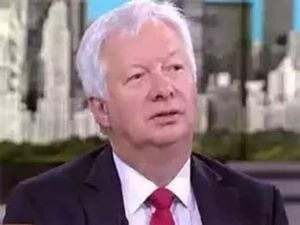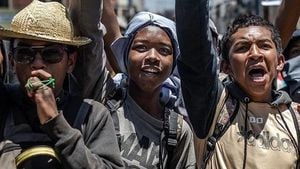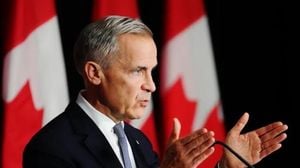On October 23, 2025, a Belfast courtroom fell silent as Judge Patrick Lynch delivered a verdict that would reverberate across Northern Ireland and beyond: the acquittal of a former British paratrooper, known only as Soldier F, on all charges related to the 1972 Bloody Sunday massacre. The decision, which came more than five decades after British soldiers opened fire on unarmed civil rights marchers in Derry, left victims’ families devastated, reignited political tensions, and reopened old wounds in a region still grappling with its violent past.
Bloody Sunday, as it is known, stands as one of the darkest chapters in the history of the Troubles—a conflict that gripped Northern Ireland for nearly 30 years. On January 30, 1972, more than 10,000 people took to the streets of Derry to demand civil rights for Northern Ireland’s Catholic minority. The peaceful protest ended in tragedy when members of the British Parachute Regiment opened fire on the crowd, shooting at least 26 unarmed civilians. Thirteen were killed on the day, and a fourteenth died from his injuries months later. The massacre became a catalyst for escalating violence between Irish nationalists seeking a united Ireland, pro-British unionists, and the British state, setting the stage for decades of bloodshed before a peace deal was struck in 1998.
The trial of Soldier F—who faced two counts of murder and five of attempted murder—was the culmination of years of campaigning by the families of the victims. The charges specifically related to the deaths of William McKinney, 26, and James Wray, 22, as well as the wounding of five others, including Patrick O’Donnell. Soldier F, protected by a court anonymity order, listened to the verdict from behind a thick blue curtain, hidden from public view in the crowded courtroom.
According to BBC News, Judge Lynch was unsparing in his criticism of the conduct of the British soldiers that day. “Members of the Parachute Regiment had shot unarmed civilians as they ran away,” he said. “Those responsible should hang their head in shame.” Yet, despite this condemnation, Lynch concluded that the evidence against Soldier F had “fallen well short of what is required for conviction.” He cited the passage of time and the resulting loss of reliable evidence as key factors, noting that “delay has, in my view, seriously hampered the capacity of the defence to test the veracity and accuracy of the hearsay statements.”
The acquittal was met with immediate and vocal outrage from the families of those killed and wounded on Bloody Sunday. Mickey McKinney, whose brother William was one of the two named victims, spoke outside the court: “Soldier F has been discharged from the defendant’s criminal dock, but it is one million miles away from being an honourable discharge. Soldier F created two young widows on Bloody Sunday, he orphaned 12 children, and he deprived dozens of siblings of a loving brother.” McKinney laid the blame squarely at the feet of the British state and the Royal Ulster Constabulary, arguing that the authorities failed to properly investigate the killings at the time.
Caroline O’Donnell, whose father Patrick was shot and wounded on Bloody Sunday and died in 2006, expressed her devastation on BBC Radio Foyle. “Really disappointed, devastated—devastated for all the families and for Derry city,” she said. “My poor Daddy lived under that dark cloud for years of being a terrorist and a bomber and gunperson.” Despite the verdict, O’Donnell vowed to continue fighting for justice, including pushing for prosecutions of soldiers suspected of perjury. The Public Prosecution Service (PPS) confirmed it is reviewing a previous decision not to prosecute 15 soldiers for allegedly lying under oath during the Bloody Sunday Inquiry, with a spokesperson telling BBC News NI that the process is ongoing and being handled by a senior lawyer not involved in the original decisions.
The verdict also drew sharp criticism from Northern Ireland’s political leaders. First Minister Michelle O’Neill, vice president of the pro-Irish unity party Sinn Féin, called the outcome “deeply disappointing.” She wrote on social media, “The continued denial of justice for the Bloody Sunday families is deeply disappointing. Not one British soldier or their military and political superiors has ever been held to account. That is an affront to justice.”
Yet, the decision was not universally condemned. Unionist parties and veterans’ campaigners welcomed the acquittal, arguing that it was time to end prosecutions of former soldiers for actions taken during the Troubles. Some see the verdict as a long-overdue closure for those who served in what they consider an impossibly difficult and dangerous period of Northern Ireland’s history. A UK government spokesperson reiterated the government’s commitment to “finding a way forward that acknowledges the past, whilst supporting those who served their country during an incredibly difficult period in Northern Ireland’s history.”
The legal path to this trial was a long and winding one. The initial investigation—the 1972 Widgery Tribunal—largely exonerated the soldiers and British authorities, a conclusion that was widely discredited by victims’ families and civil rights advocates. Decades later, the 2010 Saville Inquiry (the Bloody Sunday Inquiry) reversed that narrative, finding that there was “no justification for any of the shootings” and that paratroopers had fired at fleeing, unarmed civilians. The Saville Inquiry’s findings prompted the police to open a murder investigation, but prosecutors ultimately determined that only one former soldier would face trial, citing insufficient evidence to charge 16 others.
During the month-long, juryless trial in Belfast, Soldier F was not called to testify. He had previously told investigators he no longer had a reliable recollection of the massacre. In his judgment, Judge Lynch went further, explicitly stating that some soldiers had perjured themselves during previous inquiries. “I hold that the witnesses have told lies about the events on several occasions,” he said, singling out Soldiers H and G for committing perjury during the Widgery Tribunal and the Saville Inquiry.
For the families, the verdict brought both heartbreak and a measure of hard-won pride. Many returned to Derry on the evening of the verdict, gathering for a solemn silence at the Bloody Sunday memorial near the spot where so many lost their lives. John Kelly, whose brother Michael was killed, reflected on the decades-long campaign: “It was the evidence that let us down,” he told the BBC. “Not forgetting also that when the campaign started, we had three demands: the repudiation of Widgery, we achieved that; full declaration of innocence, we achieved that; and the third was a prosecution—we achieved the three demands, so it was a victory for us to even get him into the court.”
James Wray’s brother Liam said he was not surprised by the verdict but was grateful that the victims were “again declared as innocent.” Tony Doherty, whose father Patrick was killed and who now chairs the Bloody Sunday Trust, said, “While the verdict was disappointing for families, there was a profound sense of pride in what we have achieved as a group of working class families from Derry.”
As the dust settles on the trial, the fight for justice continues. The PPS review of perjury allegations remains ongoing, and families insist they will not give up their campaign. The acquittal of Soldier F has closed one chapter, but the legacy of Bloody Sunday—and the search for truth and accountability—remains very much alive in Northern Ireland.






